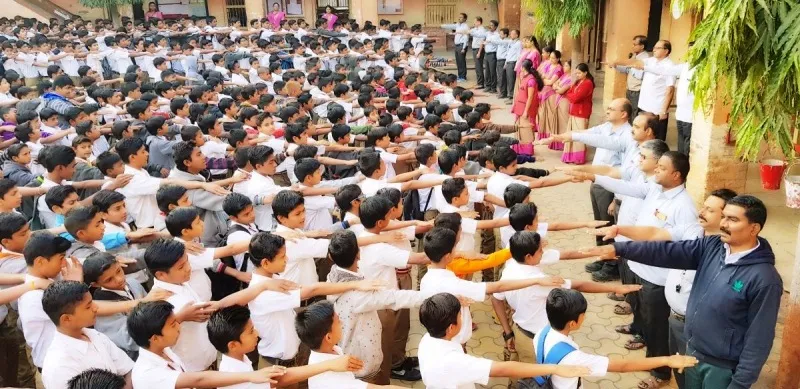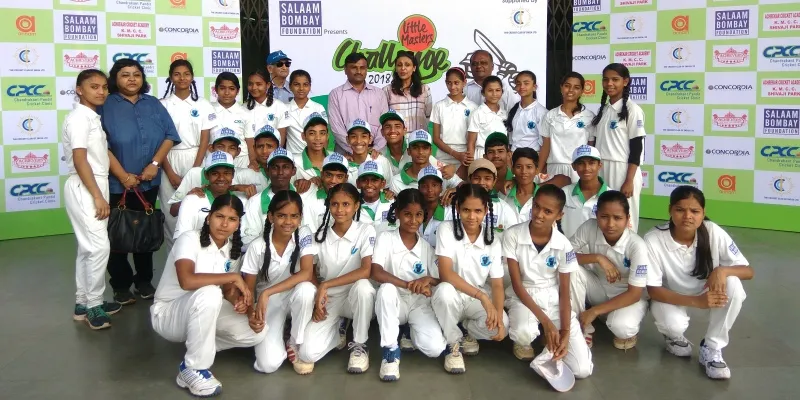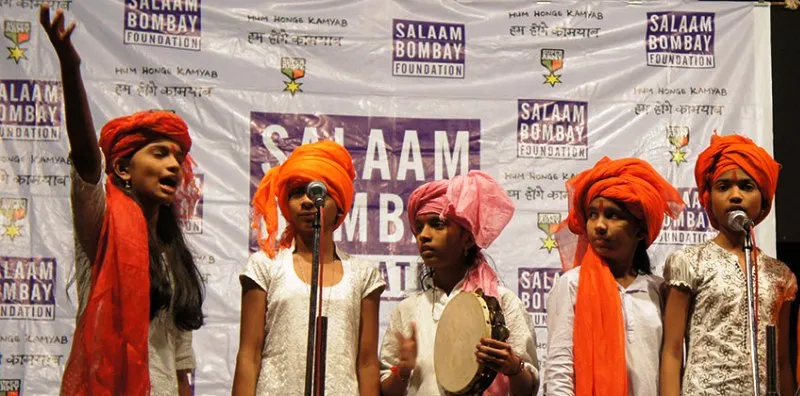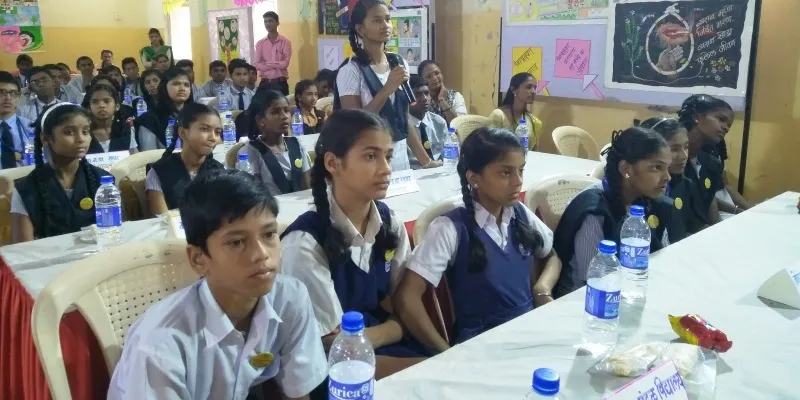This Mumbai-based organisation is promoting life skills and preventing tobacco use among low-income youth
On the eve of World Cancer Day, teachers and students from over one lakh schools across Maharashtra pledged for a tobacco-free life, thanks to Salaam Mumbai Foundation.

Tobacco claims nearly one million lives in India every year. This figure becomes even more distressing when every 16 seconds; a child tries tobacco for the first time. That's 5,500 Indian children under the age of 10 every day.
Most vulnerable to this relentless marketing by the tobacco industry are children who live in Mumbai's slums. Here, tobacco use is pervasive and the meagre home incomes make it hardly a suitable environment for children who are ill-equipped to deal with such stressors. Many start experimenting with tobacco and drop out of school to support their families’ income. By the time they reach adulthood, nearly half of the boys and one in five girls turn into tobacco-users.
To add to this existing menace, 90 percent of India's children are unfit for skilled jobs by the time they leave school. About 35 percent of children growing up in the slums do not receive education of any sort and close to 35,000 children in Mumbai between the ages of 5 and 14 are engaged in child labour.
This realisation that tobacco use is a symptom of a larger, complex problem was what led Salaam Bombay Foundation to launch initiatives not limited to just helping children lead tobacco-free lives, but also shaping them into empowered, socially responsible individuals.

Born out of an overwhelming experience
Padmini Somani was spurred on by a traumatic personal experience that caused her to take a stand against the menace of tobacco.Upon marshalling facts, she was alarmed to know that children were turning into addicts even before the age of 18. “Without an iota of doubt, I knew my focus had to be the youth of the country,” the 42-year-old says.
Padmini established Salaam Bombay in 2002 to work with children growing up in Mumbai's slums, between the age group of 12 and 17. Her motto was to enable children to stay in school and take better decisions for their health, education and livelihood.
Battling challenges
Salaam Bombay began work right away but the journey was never easy. Attracting and retaining skilled personnel was one of the team's biggest challenges, followed by getting the general public and potential donors to understand the severity of the problem. “Most people related to hunger, poverty, natural calamities and physical disabilities as social causes. Tobacco use among children was very low on their priority list,” says Padmini.
To break this myth, Salaam Bombay fought to show the problem to be as epidemic as it is, bringing to light the fact that India is the oral cancer capital of the world with 86 percent of cases being tobacco related. This helped them break ground and the organisation was given a corpus to begin its work initially. Today, most of its funding comes from corporates and grant organisations.

The Salaam Bombay solution
To achieve its vision, Salaam Bombay Foundation engages ‘at risk’ children through in-school leadership programmes and after-school sports, arts, media and vocational training academies. These programmes aim at building self-esteem and the confidence to stay in school.
Kicking off, the foundation first began its in-school tobacco control and awareness initiative, Super Army, that works on different levels. “It educates children on the ill effects of tobacco, and equips them with the life skills they need to lead change. This, in turn, gives them the confidence to explore their full potential,” says Aditi Parikh, VP - Communications, Salaam Bombay Foundation.
Super Army also help communities by engaging local leaders to support schools, worksites, and neighborhoods in their endeavour to become tobacco-free. At the society level, the team works with policymakers to implement tobacco control laws and advocate effective tobacco control policies.
To tackle its larger issue of keeping children in school, Salaam Bombay carries out projects to equip children with skills that helps their horizon grow. Speaking of Project Resume, which is aimed at teaching marketable skills to children, Aditi says, “This programme helps teenage children make informed decisions, equips them with necessary life skills, and teaches them vocational skills for sustainable careers.”

Beyond academics
The foundation does more than help children with their apprenticeship. Besides equipping them with 21st century employment skills like computer awareness and building their confidence by increasing their fluency in English, they also broaden their horizons through the creative and performing arts academies, show them how to make themselves heard through media courses, and teach skills like leadership, goal-setting, teamwork and stress management through sports.
Furthermore, the ‘Skills@School’ programme enables at-risk children to take up part-time jobs without dropping out. It equips children with necessary skills to apprentice with professionals, helping them save up for higher education, and preparing them for sustainable careers after graduation. “Skills@School effectively breaks the cycle of poverty. The programme includes courses in jewellery design, electronic repair, retail management, and hair styling amongst others. Over the years, the programme has successfully motivated children to stay in school. This has enabled them to secure sustainable jobs and lead better, healthier lives,” says Aditi.
Rural Intervention
Encouraged by its success in urban Mumbai, the Salaam Bombay Foundation started a rural outreach programme called Salaam Mumbai Foundation in 2007 focused on ‘Training the Trainer.’ Through this programme the team reaches out to the ‘influencers’ at the rural level, be it school teachers, anganwadi workers, public health workers, local NGOs, or the village sarpanch. It has also enabled thousands of village teachers take up anti-tobacco causes through the state-level training programmes. “The first level of interaction is with the master trainers, who are government appointees. They, in turn, train school teachers on the tobacco issue and the curriculum to be taught in school,” says Aditi.
This programme reaches its peak every year on the eve of World Cancer Day, February 3. This year it brought together teachers and students from over one lakh schools across Maharashtra to pledge for a tobacco-free life. The activity, an extension of the NGO’s tobacco-free school campaign; had all the participating schools conducting an awareness drive along with anti-tobacco messaging. It encouraged over seven lakh teachers and over two crore children to lead a healthier life.
Enabling the youth for a better tomorrow
Since its inception in 2007, the rural outreach programme has covered 30 districts of Maharashtra, and has impacted over one crore children across more than 48,000 schools. It has also reached states like Rajasthan, Gujarat, Karnataka and Madhya Pradesh. The Super Army and skills programme, which have impacted over five lakh children since its inception has also recently expanded to West Bengal.
The Salaam Bombay Foundation credits its success to a team of 118 field facilitators who are given prior training, undergo mock sessions and then deliver the model at school. “Our team of employees have established Balpanchayats for students to voice their concerns; they have advocated against tobacco at popular festivals, curbed surrogate tobacco ads and have brought tobacco warnings to cinema. We plan to go pan-India in the long run.”
This impact has been evident, as over the years scores of children have received full-fledged scholarships to colleges based on the technical skills they have developed and honed at the Salaam Bombay Foundation. Moreover, the organisation has been responsible for systemic changes that have led to better implementation of existing tobacco control laws. It's programme was also crowned an effective model of school-based tobacco use prevention that low-income schools in India and other low- and middle-income countries can replicate by the Harvard School of Public Health.







